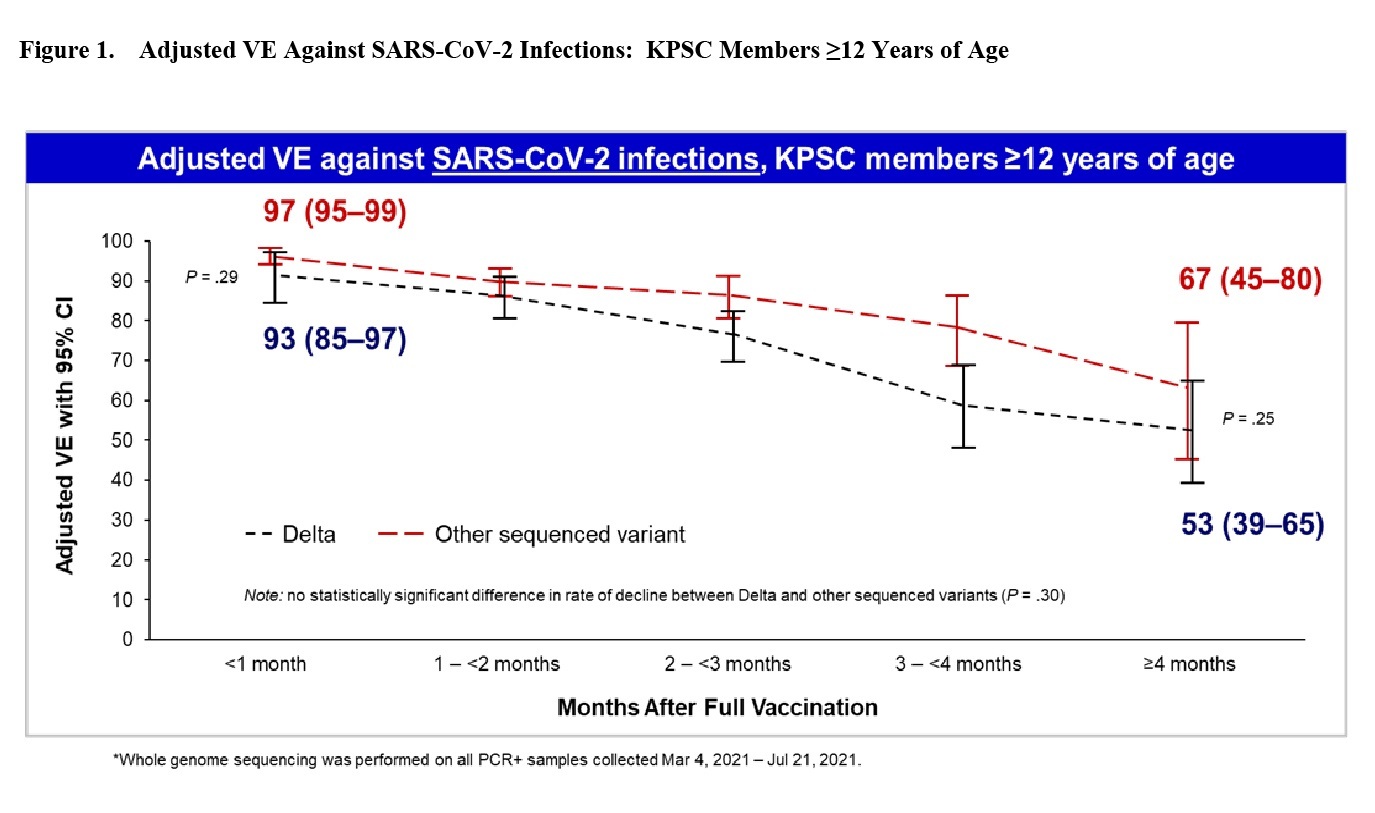The effectiveness of the Pfizer-BioNTech vaccine against the SARS-CoV-2 delta strain of coronavirus drops from 93% to 53% four months or more after the second vaccination, follows from the data provided by the manufacturer of the drug for consideration by the American medical regulator FDA.
The supervisory authority is preparing to study the feasibility of using a booster dose of the Pfizer-BioNTech vaccine to increase protection against COVID-19.
In particular, data from a study by Kaiser Permanente Southern California (KPSC) on the effectiveness of the drug, based on a sample of morbidity and hospitalizations due to coronavirus infection, from December 14, 2020 to August 8, 2021, are cited.
From this information it follows that the effectiveness of the Pfizer-BioNTech vaccine against the delta strain remains at a high level one month after receiving both doses of the drug and amounts to 93% (97% against other strains).
However, already four months after vaccination, these indicators decrease to 53% for the delta strain and to 67% for the remaining mutations.
At the same time, the vaccine remained highly effective in preventing the course of the disease requiring hospitalization (93%).
Note that earlier the FDA approved the use of the third dose of the vaccine for people with weakened immunity.
This measure applied to Pfizer-BioNTech and Moderna.
Graph from document prepared by vaccine manufacturer Pfizer for the FDA
Putin on revaccination
Meanwhile, Vladimir Putin, during an online meeting with the Governor of St. Petersburg Alexander Beglov, noted the importance of revaccination against coronavirus.
He said that in his environment several people fell ill who did not receive the booster vaccine in a timely manner.
“Some of my colleagues from the protocol, from the security service, from the press service did not do (revaccination. -
RT
) on time, did not follow the captions that they should protect, and this is the result - I have to work for some time in conditions of forced isolation , - said the head of state.
- But this is not the most important thing.
The most important thing is that those who are vaccinated, those who have encountered the infection, pass it quite easily, without serious complications. "
Comparing the level of antibodies after vaccination and revaccination against SARS-CoV-2, experts note that the number of antibodies in the second category, according to some reports, is higher.
In this regard, in particular, the doctor-immunologist, candidate of medical sciences Nikolai Kryuchkov spoke out.
According to him, after vaccination, immunoglobulins G "reach maximum" after about a week and a half, after which their level gradually decreases.
“So after about three - three and a half months, their level falls two and a half - three times from the maximum.
And a person approaches revaccination with significantly lower values.
There are already works that show that the maximum of antibodies in revaccinated people is higher.
But it is still impossible to say for sure about this, "- quotes a specialist" Moscow 24 ".
At the same time, according to the expert, it is not necessary to check the level of antibodies before revaccination against coronavirus.
He explained that the required amount of antibodies to protect against disease is individual for each person.
In turn, Olga Karpova, head of the Virology Department of the Biological Faculty of Moscow State University, in an interview with RT, said that the issue of revaccination should be taken seriously.
“We don't know everything yet, we don't have enough statistics yet.
And in order to protect themselves, everyone should think about whether they have protection.
Protection is, of course, antibodies, ”she said.
As noted by the virologist, you need to be vaccinated six months after vaccination.
In this regard, she noted the drug "Sputnik Light".
“This is a one-shot vaccine that's effective and will increase your protection.
Of course, if you are ready to do an analysis for antibodies and find out that they are high enough for you, and most importantly, you have a specialist who interprets the results, then you can wait for some time, ”Karpova concluded.
Latest incidence data
Over the past day, 19,905 cases of coronavirus infection were detected in Russia.
The day before, 19,594 cases were recorded.
In total, 7,234,425 COVID-19 episodes have been confirmed in the country since the start of the pandemic.
Over the past day, 791 people died of complications due to coronavirus infection and concomitant diseases.
794 patients died the day before.
The total number of deaths reached 196 626. At the same time, 6 469 017 patients were cured of COVID-19 in the country.
During the day, 16 619 people recovered, the day before - 17 326.
According to the Ministry of Health of the Russian Federation, almost 47.5 million Russians were vaccinated with the first component of the coronavirus vaccine.
According to the head of the department, Mikhail Murashko, 41 million people received two components of the vaccine.
In turn, the head of Rospotrebnadzor Anna Popova said that all anti-epidemic measures are being observed at polling stations.
According to her, "all points are organized exactly as it should be."

